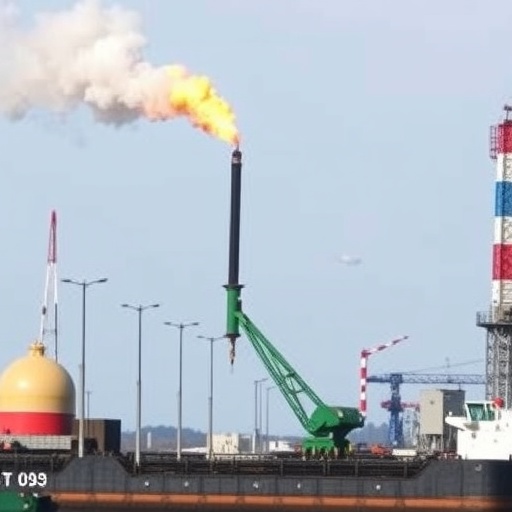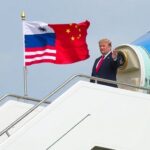Global Coalition Pledges to Banish Russian Oil and Gas from World Markets: Starmer’s Bold Move After London Summit with Zelensky
In a resounding show of unity against Russia’s ongoing aggression in Ukraine, UK Prime Minister Keir Starmer has spearheaded a powerful commitment from allied nations to systematically remove Russian oil and gas from the global market. This pledge emerged from a high-stakes summit in London, where Starmer convened over two dozen European leaders alongside Ukrainian President Volodymyr Zelensky. The announcement, delivered on the heels of intensified Russian attacks, signals a strategic escalation in Western support for Ukraine, blending economic pressure with military aid. As Starmer emphasized, “We are not just supporting Ukraine—we are dismantling the financial lifelines that fuel Putin’s war machine.”
The coalition’s resolve comes at a critical juncture, with Russia still exporting vast quantities of energy resources despite previous sanctions. In 2023 alone, Russian oil revenues topped $300 billion, providing a substantial economic backbone for its military operations. This new initiative aims to choke off those funds, potentially reshaping global energy dynamics and bolstering Ukraine’s defense capabilities through accelerated UK missile production.
London Summit Forges Ironclad Alliance Against Russian Energy Exports
The London summit, held at the historic Lancaster House, brought together representatives from key European allies, including Germany, France, Italy, Poland, and the Baltic states, forming what Starmer dubbed the “Coalition of the Willing.” This gathering was more than a diplomatic photo-op; it was a tactical war room where leaders hashed out concrete measures to enforce stricter Russian oil sanctions. Zelensky’s virtual participation—due to security concerns—added emotional weight, as he recounted the devastation in Ukraine from recent drone strikes on civilian infrastructure.
Attendees numbered over 24, hailing from NATO members and beyond, underscoring the breadth of international solidarity. Starmer opened the proceedings with a stark assessment: “Russia’s energy exports are the oxygen of its invasion. Today, we commit to cutting that supply line.” Discussions delved into enforcement mechanisms, including enhanced monitoring of shadow fleets—opaque tanker operations that have evaded prior sanctions—and coordinated price caps on Russian crude. European allies, long reliant on Russian gas via pipelines like Nord Stream (now defunct), pledged to diversify imports further, with projections indicating a 50% reduction in Russian energy dependency by 2025.
One pivotal moment came during a closed-door session where Zelensky urged for immediate action. “Every barrel of Russian oil sold funds missiles that strike our cities,” he stated via video link, his voice carrying the gravity of a leader under siege. The summit’s joint communiqué outlined a phased approach: initial tightening of existing sanctions in Q4 2024, followed by multilateral agreements to bar Russian LNG from European ports by mid-2025. This Coalition of the Willing extends beyond Europe, with invitations sent to G7 partners like the US, Japan, and Canada, aiming for a truly global embargo.
Behind the scenes, logistical challenges were addressed. For instance, Poland’s Prime Minister Donald Tusk highlighted the need for alternative supply routes, noting that his country has already reduced Russian imports to near zero. “We’re leading by example,” Tusk said, emphasizing Warsaw’s role in rerouting Ukrainian grain exports through solidarity lanes. The summit’s success was evident in the palpable shift from rhetoric to resolve, setting the stage for enforceable policies that could slash Russia’s energy export revenues by an estimated 40% within the next year.
Starmer Unveils Ambitious Plan for Russian oil sanctions Enforcement
At the heart of the pledge lies a multifaceted strategy to implement ironclad Russian oil sanctions, targeting not just exports but the entire supply chain. Prime Minister Starmer, leveraging the UK’s financial prowess, announced the creation of a joint task force with European allies to track and intercept Russian oil shipments. This includes deploying advanced satellite surveillance and partnering with international shipping insurers to deny coverage to vessels carrying sanctioned cargo.
Current data paints a grim picture of Russia’s evasion tactics. Despite the EU’s 2022 oil embargo, Russia redirected flows to India and China, with exports hitting 7.5 million barrels per day in early 2024—up 5% from pre-invasion levels. The new sanctions framework proposes a global price cap of $30 per barrel for Russian Urals crude, enforced through secondary penalties on buyers. “This isn’t about punishment; it’s about peace,” Starmer declared during a press conference, flanked by EU foreign ministers.
European allies are pivotal here. Germany’s Chancellor Olaf Scholz committed €10 billion to green energy transitions, aiming to wean off any residual Russian gas. France, under President Emmanuel Macron, pledged naval patrols in the Mediterranean to monitor tanker movements. Italy, a former major importer, announced plans to phase out Russian contracts entirely by 2026, investing in Algerian and Azerbaijani supplies instead. These commitments form the backbone of the Coalition of the Willing, ensuring collective enforcement to prevent sanction circumvention.
Experts predict significant market ripples. The International Energy Agency (IEA) forecasts that full implementation could displace 3 million barrels per day of Russian supply, pushing global oil prices up temporarily by $5-10 per barrel before stabilizing through increased US and Saudi production. For consumers, this means higher energy bills in the short term, but Starmer countered with UK subsidies for renewables, estimating a net savings of £500 per household by 2030. Quotes from industry leaders, like BP’s CEO Murray Auchincloss, underscore the urgency: “The time for half-measures is over; robust sanctions will accelerate the shift to sustainable energy.”
Moreover, the plan addresses gas specifically. With Russian pipeline gas to Europe already curtailed, the focus shifts to LNG. The UK, a net LNG importer, will lead efforts to blacklist Russian facilities, collaborating with the US—the world’s top LNG exporter—to fill the gap. This strategic pivot not only pressures Moscow but also fosters long-term energy security for Ukraine support initiatives.
Accelerating Missile Production Bolsters Ukraine Support Arsenal
Beyond economic warfare, the summit spotlighted military reinforcement, with Starmer revealing the UK’s intent to double missile production for Ukraine within 18 months. This Ukraine support package includes long-range Storm Shadow missiles and precision-guided munitions, critical for Kyiv’s counteroffensives. “We’re not just talking defense; we’re enabling Ukraine to strike back effectively,” Starmer affirmed, citing intelligence reports of Russian buildups near Kharkiv.
The UK’s defense ministry has allocated £3 billion to ramp up manufacturing at facilities in Bolton and Stevenage, partnering with BAE Systems to produce 1,000 additional units annually. This acceleration addresses Ukraine’s ammunition shortages, exacerbated by delays in US aid. Zelensky praised the move: “British missiles have saved lives; more will turn the tide.” European allies echoed this, with France committing Mirage 2000 jets and Germany promising Leopard tank upgrades.
Contextually, this builds on prior commitments. Since 2022, the UK has delivered over 100 Storm Shadow missiles, enabling strikes on Russian logistics hubs. Production hurdles, including supply chain bottlenecks for rare earth metals, are being tackled through EU-wide procurement. The Coalition of the Willing will coordinate deliveries to avoid overlaps, ensuring a steady flow to the front lines.
Statistics highlight the stakes: Ukraine has fired over 10,000 Western-supplied missiles since the invasion, destroying an estimated 20% of Russia’s Black Sea Fleet. Yet, with Russian production at 3 million artillery shells monthly, urgency is paramount. Starmer’s plan includes training programs for Ukrainian forces, with 5,000 troops set to receive UK instruction by year’s end. This holistic Ukraine support approach intertwines military aid with the economic squeeze via Russian oil sanctions, creating a dual-front pressure on Putin.
Broader implications for NATO cohesion are profound. The summit’s outcomes reinforce Article 5 commitments, with smaller European allies like Lithuania voicing fears of escalation. “Solidarity today prevents wider conflict tomorrow,” said Lithuanian President Gitanas Nausėda. As production scales, expect announcements of joint ventures, potentially involving US firms like Lockheed Martin, to sustain the momentum.
European Allies Rally Behind Coalition of the Willing for Lasting Impact
The Coalition of the Willing isn’t a fleeting alliance; it’s a blueprint for sustained pressure on Russia. European allies, from Scandinavia to the Balkans, have signed on with tailored contributions. Sweden and Finland, recent NATO joiners, pledged intelligence sharing on Arctic energy routes, where Russia eyes expansion. The Netherlands, home to major ports like Rotterdam, committed to stricter vetting of oil imports, potentially blocking 500,000 barrels of suspect cargo monthly.
Reactions have been overwhelmingly positive, though not without caveats. EU Commission President Ursula von der Leyen hailed the initiative as “a game-changer for energy independence,” while warning of inflationary risks. In financial hubs like London, markets responded bullishly, with Brent crude futures rising 2% post-announcement. Analysts from Goldman Sachs project that combined with Russian oil sanctions, global emissions could drop 1.5% as cleaner alternatives proliferate.
Challenges loom, including Russia’s pivot to BRICS nations for oil sales. India, absorbing 40% of redirected exports, faces diplomatic overtures from the coalition to align. Starmer’s team is preparing incentives, like discounted LNG from Qatar, to sway non-aligned buyers. Domestically, UK public support stands at 65% for escalated Ukraine support, per recent YouGov polls, buoyed by narratives of defending democracy.
Looking ahead, the coalition eyes quarterly reviews to adapt strategies, with the next summit slated for Brussels in 2025. This forward momentum promises to erode Russia’s war chest, fostering a pathway to negotiations on Ukraine’s terms. As Starmer wrapped up, “Our actions today echo through history—ensuring a free Europe for generations.” The blend of economic resolve and military might positions the West to outlast Putin’s gambit, reshaping geopolitics in the process.
In the coming months, watch for legislative pushes in the UK Parliament to codify these pledges, alongside EU regulatory updates. The ripple effects on global trade could spur innovations in battery storage and hydrogen, accelerating the net-zero transition. Ultimately, this coalition’s tenacity may well define the post-invasion era, proving that unity can indeed vanquish aggression.








